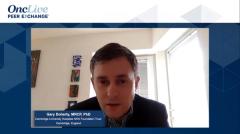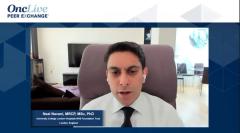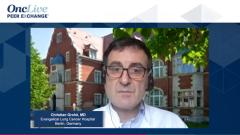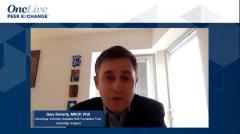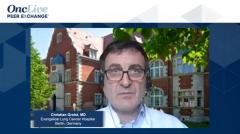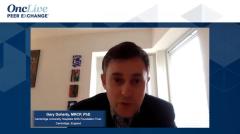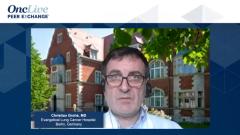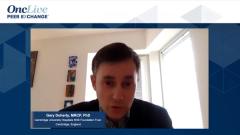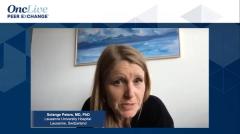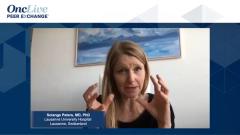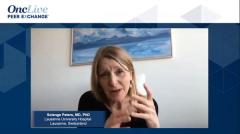
Clinical Implications of the ADAURA Trial
A panel of key opinion leaders in lung cancer considers the clinical implications of the ADAURA trial of adjuvant osimertinib and discuss how results may affect the treatment landscape in early stage NSCLC.
Episodes in this series

Neal Navani, MRCP, MSc, PhD: Let’s talk about some of the clinical implications. Gary, let’s say you’re seeing a patient in your clinic and discussing adjuvant treatment for a patient with stage IB disease, and you know now that they have an EGFR mutation. How does that frame your discussion?
Gary Doherty, MRCP, PhD: In the United Kingdom, we don’t have access to adjuvant osimertinib. It’s under review by NICE [National Institute for Health and Care Excellence]. I’ll answer the question as if we did have access to it. First, I agree with Solange’s points. This is a different disease. I feel that this is much more likely to be a systemic disease. We don’t know if, within the ADAURA trial, osimertinib is curing extra patients. It would be very interesting to see the long-term follow-up, to see whether that’s the case. We know it’s delaying recurrence, including those with—very surprisingly—many in stage IB of the disease. There’s a huge controversy; that’s why you’ve asked me the question. There have been a huge number of debates on this issue by very prominent oncologists who have come down firmly on 1 side or the other, both in terms of DFS [disease-free survival] as a surrogate end point for OS [overall survival], as well as what we should do with patients at an earlier stage. My point would be to ask the patient. The patient is the person who would be taking this treatment. It’s not without its toxicities. They will be taking it for 3 years if they sign up for it, or for as long as they tolerate it and don’t progress. With the hazard ratio of 0.5 for this population, it was incumbent upon us, if we have access to the drug, to offer it to the patients. If I had stage IB disease, I would take it. Having the risk of relapse is very considerable. If this was a breast cancer adjuvant trial, this would be hailed as a major advance. Yet we’re still having these debates in the field of lung cancer treatment, perhaps because we’re so pessimistic about this patient population. I would offer it, but some patients may refuse it based on the modest, but still extremely significant, reduction in disease-free survival.
When we talk to patients, disease-free survival matters; of course it matters. I suspect these patients would take it, but there are reasons why you wouldn’t offer it. First, these patients need to meet the criteria for ADAURA, essentially. We need to make sure that we’re not offering it to patients who don’t have the canonical EGFR alterations: the exon 19 deletions and L858R mutations. We need to make sure that they are at PS [performance status] 0/1 and that they don’t have contraindications to the use of osimertinib, which includes interstitial lung disease, pneumonitis, QTc [corrected QT] prolongation, and significant cardiac arrhythmias. Also important is that they have a life expectancy from their comorbidities that would mean that they would be likely to benefit from adjuvant osimertinib. Those are some of the things that I would be weighing in my own practice.
Neal Navani, MRCP, MSc, PhD: Thanks, Gary. That’s very clear. One of the issues is that you will be giving a treatment to a group of people who, for 60% of them, did not require it in the first place and will not develop any recurrent disease. That’s 1 of the cost-effective arguments against it. Solange, do you want to come back against that?
Solange Peters, MD, PhD: Yes. The basic principle of adjuvant treatment is that you treat a whole group of patients to benefit some of them. In the ideal world, at some point, we might try to identify a smaller group of patients to treat again for the benefit of some of them. Remember, we give chemotherapy to 100% of the patients we think would fit while 5% of them are potentially benefiting. We do the same when treating breast cancer, even with a worse ratio. Of course, osimertinib has its costs in terms of the financial burden, but in terms of toxicity it’s still not to be compared with chemotherapy. Remember the long-term effects of adjuvant chemotherapy for patients with lung cancer in terms of vascular disease. We must understand what we do with that treatment. The ADAURA trial should set some parameters for us. Will we be able to use some minimal residual disease at some point, trying to look at very sensitive tests or at the remaining presence of an EGFR mutation in the serum, allowing us to reduce the group of patients to treat? Not knowing that, we’re in a nice space to give adjuvant treatment with such a hazard ratio. To me, that’s not the argument. There might be other points of discussion—duration, why 3 years, and so on—but the question of “What an adjuvant treatment?” shouldn’t be put in place again. We accepted this principle by completing a radical treatment.
Neal Navani, MRCP, MSc, PhD: I totally agree. As you have both pointed out, disease-free survival [DFS] is actually a very important patient-orientated outcome. One of the important pieces of data that has come out more recently is the quality-of-life datum from the ADAURA trial. Many patients and many guideline bodies attach a lot of significance to quality of life—quite rightly—and that’s given by DFS. This can be reflected in health economic analysis. It’s not just overall survival that affects health economic analysis. It’s how patients’ quality of life is and how long they’re experiencing that quality of life, which can influence whether a medication is approved by a guideline body. Christian, can I come to you with our patient with stage IB? What are your thoughts on this area? Would you be recommending adjuvant osimertinib to a patient with stage I disease who has an EGFR mutation after surgery?
Christian Grohé, MD: First, I would like to add some more comments to the discussion we have at the moment. We must understand that, obviously, we need testing of all patients who undergo any systemic treatment option and with lung cancer. Why is that? If we just realize that there are a lot of clinical studies underway that look for the combination of adjuvant chemotherapy and then maintenance therapy with I/O [immuno-oncology], or neoadjuvant treatment, we would be better. All these studies—large studies over the last 2 or 3 years—look for the first set of data, and that did not include driver mutations. We don’t have analysis for this. This is obviously something we have to face in the near future. How to treat the patient at an early stage is based on what kind of information? Saying that, we cannot ignore the fact that we must look for biomarkers, in particular trial mutations, in this cohort. That’s basically what I mean; we must go for all types of mutations that are druggable and that are treatable in this in this context.
Once we have that information, we might identify patient cohorts who don’t have a benefit in the adjuvant setting. This is something we would like to look for. We all know, obviously, that even EGFR mutated lung cancer has a distinct molecular pathology and a distinct way of metastasis spreading. We can suppress clonal expansions of the EGFR tumor with TKIs [tyrosine kinase inhibitors], but we cannot eradicate as we can with I/O, where we obviously eradicate certain clonal expansions. Taken together, I would look for composite end points to understand that the stage IB patient should undergo an adjuvant treatment option, but that should be based on molecular profiling and certain proportions. We understand, in terms of biomarkers, nonetheless—also including PD-L1—that this is due for the seventh edition. In the eighth edition, that’s IIA, and that’s within the frame we’re looking for at the moment.
Neal Navani, MRCP, MSc, PhD: Christian, what about this issue surrounding the use of chemotherapy? Should osimertinib be a replacement for adjuvant chemotherapy or not?
Christian Grohé, MD: In terms of the DFS data we have, when comparing the patient cohort that had adjuvant chemotherapy and then osimertinib with patients who took osimertinib only, we find that they don’t have any major disbalance, and that this isn’t much different. You can see that in the supplemental section of that paper, which was published at the time of the osimertinib presentation. We see a lot of patients worldwide who don’t want any platinum-based chemotherapy as an adjuvant protocol anyway. The older population don’t tolerate it very well, and it’s problematic. If you look at your own data registries at your institutions, what’s the proportion of patients who find they underwent platinum-based chemotherapy who completed 4 cycles of chemotherapy? There’s a large unmet need, and we can offer something—saying, “This is the best of what we have with our knowledge at the moment”—potent to that treatment. That’s adjuvant chemotherapy followed by TKI. It’s an option that we should have at hand to discuss with a patient, and we should have that patient in a controlled and surveilled environment after surgery.
Neal Navani, MRCP, MSc, PhD: Thank you. Solange, what’s your view on the role of chemotherapy? In this adjuvant setting for a patient with an EGFR mutation, do you think adjuvant osimertinib should replace it or be added to it?
Solange Peters, MD, PhD:We need to be very scientific in the way we approach data. Data are not about the way we like to treat patients or what patients prefer. Data are the way the question has been addressed. The ADAURA trial has been asking the question of the role of osimertinib after surgery, and investigators base this decision on adjuvant chemotherapy vs the placebo and DFS. The role of chemotherapy hasn’t been questioned at all. By the way, most of the patients in that trial received chemotherapy as it would be done in Europe and in the United States. This trial wasn’t asking this question, meaning that if you compare patients who had chemotherapy or no chemotherapy, the patients in the 2 groups are imbalanced by nature because it is the investigator’s decision when it comes to all the prognostic factors you could imagine. More than that, it’s too far to see any difference in adjuvant chemotherapy vs nonadjuvant chemotherapy. If a patient says to you, “I don’t want chemotherapy excluded; you will not convince me,” I would give them osimertinib. I will never dare to base my practice on wrong science and personal assumptions on the question that wasn’t asked. This patient had to receive surgery and chemotherapy based on the usual paradigm or the 4 adjuvant trials. If they have an EGFR mutation, they would be offered osimertinib.
In the scenario of rejection of chemotherapy, at Lausanne University Hospital in Switzerland, it’s probably older patients with EGFR who are refusing—there are probably some younger patients, right—but 1 of 5 patients doesn’t want chemotherapy, even if you exposed the risk. For this patient, osimertinib will be fine, but for other patients, you have to follow what the science tells you. This means, unfortunately, that chemotherapy will remain. By the way, I don’t think this question will ever be addressed by anyone, because nobody would benefit from questioning those 300 million trials, right? It’s going to be this way for a while.
Transcript Edited for Clarity


